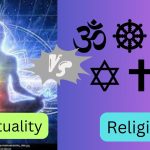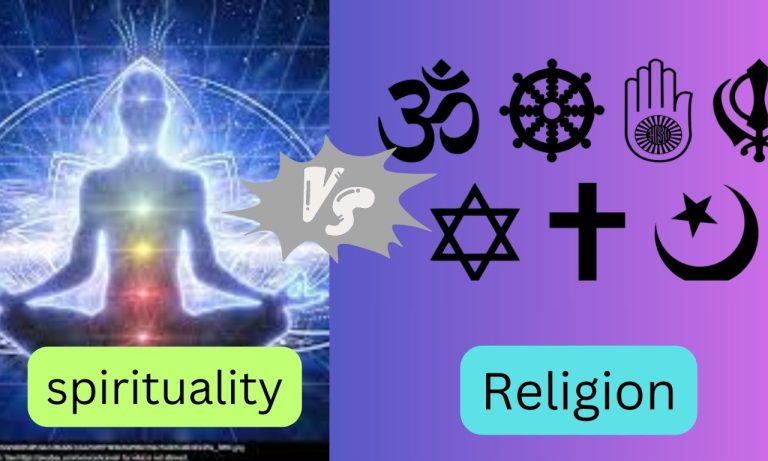If you’ve ever found yourself in the realm of self-discovery, you’ve probably encountered the terms “spiritualism” and “spirituality.”
In this blog post, i’m going to reveal 55 differences between Spirituaism vs spirituality.
Spiritualism vs. Spirituality- History
Check this also: best countries to travel for spiritual journey.
19th Century Origin: Spiritualism emerged in the mid-19th century, primarily in the United States and Europe.
Communication with Spirits: It focused on the belief in the ability to communicate with spirits of the deceased.
Mediumship: Mediums played a central role, acting as intermediaries between the living and the spirit world.
Peak Popularity: The movement reached its peak in the mid-19th century, attracting widespread interest and controversy.
Decline and Persistence: While it declined in popularity, spiritualism persists to this day with various organizations and practitioners.
Ancient Roots: Spirituality has ancient roots, with principles found in various religious and philosophical traditions throughout history.
Personal Growth: It has always emphasized personal growth, self-awareness, and understanding of the self and the universe.
Diverse Beliefs: Spirituality transcends religious boundaries and encompasses diverse beliefs and practices.
Contemporary Expression: In the contemporary context, spirituality is often associated with a more flexible, individualized, and holistic approach to personal development and self-discovery.
Ongoing Evolution: Spirituality continues to evolve and adapt to the changing cultural and social landscape, making it a highly adaptable and enduring aspect of human culture.
Spiritualism vs. Spirituality- Comparison Table
let’s summarize the distinctions between spiritualism and spirituality in a comparison table for quick reference:
| Aspect | Spiritualism | Spirituality |
|---|---|---|
| Beliefs | Communication with spirits, often through mediums | Personal growth, connection to the self and universe |
| Purpose | Communication with the spirit world | Personal growth, inner peace, self-awareness |
| Practice | Ritualistic, structured, mediumship sessions | Flexible, personal practices (meditation, mindfulness) |
| Belief Systems | Afterlife, spirits, often with specific dogma | Varied, may coexist with or without religious beliefs |
| Communication with Spirits | Primary Objective | Not the primary goal, focuses on the inner self |
| Material Focus | Use of tools (e.g., crystals) to enhance connection | Emphasis on non-material experiences |
| Community vs. Individual | Often practiced in groups, formal settings | Can be practiced individually or within communities |
| Ritual vs. Spontaneity | Structured rituals (e.g., séances) | Spontaneous, less rigid in practice |
| Boundary of Belief | Specific dogma | More fluid and adaptable |
| Connection to Higher Power | Often incorporates belief in higher power | May or may not involve a belief in a higher power |
| Mediumship as a Profession | Common, mediums offer services | Less common, not seen as a profession |
| Role of Teachers | Guided by mentors, leaders, or specific training | May or may not involve mentors or formal training |
| Historical Roots | Originated in the mid-19th century | Ancient roots, found in various world traditions |
| Role of Philosophy | Emphasis on religious and philosophical concepts | Inclusive, draws from various philosophies |
| Emphasis on Symbols | Specific symbols hold sacred meanings | Personal interpretation of symbols |
| Reverence for Symbols | Symbols hold spiritual significance | Symbols may have diverse interpretations |
| Use of Trance States | Trance states used to facilitate spirit communication | Meditation may be used, but not necessarily trance |
| Interpretation of Suffering | Suffering may be viewed as a test or spiritual growth | Emphasis on finding meaning and growth through adversity |
| Focus on Specific Spirits | Emphasis on connecting with specific spirits | Seeks to connect with a broader sense of spirituality |
| Role of Ethics | Emphasis on adherence to moral guidelines | Values ethical conduct but interpretation varies |
| Approach to Healing Practices | Involves healing practices and channeling healing energy | Healing practices can be psychological, emotional, or holistic |
| Perceptions of Death | Views death as a transition to another realm | Views death as a natural part of life, focuses on the quality of life |
| Connection to Nature | Focuses on communication with spirits rather than nature | Encourages a profound connection to nature as a source of inspiration |
| Cultural Influence | May have distinct cultural influences depending on region | Transcends cultural boundaries, shaped more by personal experiences |
| Connection to Religion | Often distinct from mainstream religions but shares some beliefs | Can be practiced within or outside of religious contexts |
Spiritualism vs. Spirituality- 55 Differences You Must Know
1. Definition Matters
Spiritualism is a belief system or practice that revolves around the idea of communicating with the spirits of the deceased.
It often involves mediums or psychics who claim to connect with the spirit world.
These practitioners believe in the afterlife and aim to communicate with those who have passed on.
Spirituality, on the other hand, is a broader and more encompassing concept.
It’s about the exploration of the self, the universe, and our purpose in it.
Spirituality doesn’t necessarily involve contacting spirits; instead, it focuses on personal growth, self-awareness, and a connection to something greater than oneself, which may or may not include a belief in a higher power.
2. Purpose and Practice
Spiritualism is typically more ritualistic and structured in its practices. Séances, Ouija boards, and mediumship sessions are common methods used to connect with spirits.
The goal is often to receive messages or guidance from the spirit world.
Spirituality is a much more flexible and personal pursuit. It’s about exploring one’s own beliefs, values, and inner self.
Practices may include meditation, yoga, mindfulness, or any activity that fosters a deeper understanding of one’s purpose and connection to the universe.
3. Belief Systems
Spiritualism tends to be more specific in its belief system.
Practitioners often embrace the idea of an afterlife, reincarnation, and the existence of spirits and ghosts.
It’s a more structured approach to the mysteries of life and death.
Spirituality, in contrast, is not tied to any particular dogma.
It can coexist with religious beliefs or be entirely secular.
The focus is on personal growth, introspection, and connecting with the divine or a higher power, whatever that may mean to the individual.
4. Communication with the Other Side
The primary objective of spiritualism is to establish a connection with the spirit world.
This communication is often facilitated by mediums, who act as intermediaries between the living and the deceased.
Spirituality, on the other hand, emphasizes connecting with the inner self and the universe.
It’s not necessarily about seeking communication with external entities, but rather, understanding your own consciousness and place in the grand scheme of things.
5. Material Focus vs. Non-material Focus
Spiritualism often leans towards the material world, seeking tangible evidence of the spirit realm.
Mediums may use physical tools like tarot cards, crystals, or pendulums to establish contact with spirits.
It’s a quest for concrete proof of the afterlife.
Spirituality, on the other hand, is primarily non-material.
It’s about finding inner peace and enlightenment through intangible experiences.
Meditation and mindfulness, for instance, encourage a detachment from the material world, focusing instead on the inner journey.
6. Community vs. Individuality
Spiritualism is often practiced within a community.
Mediums, psychics, and seekers come together to communicate with the spirit world. Séances and group sessions are common.
It’s a shared experience that often requires the presence of others.
Spirituality can be a more solitary journey.
While some individuals engage in spiritual practices within a community, it’s equally common to seek spiritual enlightenment alone.
The focus is on the personal connection with the divine or the universe.
7. Ritual vs. Spontaneity
Spiritualism relies on specific rituals and procedures.
Séances have a structured format, and certain actions are taken to invoke spirits. It’s a formal and often scripted process.
Spirituality is open to spontaneity.
There are no rigid rules or prescribed rituals.
Spiritual experiences can happen at any moment, whether it’s during meditation, a walk in nature, or in a moment of profound insight.
8. Boundary of Belief
Spiritualism has a defined boundary – it encompasses belief in the spirit world and the afterlife. It’s a specific, delimited set of beliefs and practices.
Spirituality is boundless. It doesn’t require you to believe in spirits or a particular religious doctrine.
It’s adaptable and can coexist with a wide range of worldviews, from atheism to agnosticism to religious faith.
9. Evidential vs. Philosophical
Spiritualism is often concerned with providing evidence of the existence of spirits and the afterlife.
The emphasis is on collecting empirical data and validation through mediumship sessions, seeking to prove the connection between the living and the deceased.
Spirituality is more about philosophy and personal exploration.
It’s less concerned with empirical proof and more focused on the individual’s inner transformation, growth, and understanding of the self and the universe.
10. Dogma vs. Fluidity
Spiritualism tends to have a set of beliefs and practices that are followed relatively rigidly.
It often adheres to a structured set of spiritual principles, rituals, and codes.
Spirituality, in contrast, is highly fluid. It encourages personal interpretation and adaptation.
It can coexist with various belief systems and doesn’t impose strict rules or dogmas.
11. Focus on the Deceased vs. Inner Self
Spiritualism primarily revolves around connecting with and receiving messages from the spirits of the deceased.
The emphasis is on the external world, communicating with entities beyond our earthly realm.
Spirituality directs its focus inwards, aiming to understand the depths of the self, personal growth, and the connection with the universe.
It’s about exploring one’s consciousness and inner world.
12. Connection to Higher Power
Spiritualism often incorporates a belief in a higher power or divine beings.
It may involve the worship of deities or the acknowledgment of a higher spiritual hierarchy.
Spirituality is more inclusive.
It doesn’t necessarily require a belief in a higher power.
It can be a personal journey that involves the recognition of a higher power or a deep connection to the universe, depending on individual beliefs.
13. Objective – Communication vs. Transformation
Spiritualism seeks communication and connection with the spirit world.
The primary goal is to interact with spirits, often aiming to receive messages or guidance from the departed.
Spirituality is more focused on personal transformation.
It’s about evolving, growing, and gaining a deeper understanding of oneself and the universe.
Communication with spirits is not its primary objective.
14. Time and Space – The Present vs. The Beyond
Spiritualism deals primarily with the present moment and the communication that can occur here and now with spirits.
It’s about connecting with entities that may exist in a different dimension or realm.
Spirituality, in contrast, transcends time and space.
It seeks to understand the broader concepts of life, death, and the universe. It’s not limited to the present moment but encompasses the past, present, and future.
15. External vs. Internal Validation
Spiritualism often relies on external validation.
The evidence of communication with spirits is crucial to its practitioners.
The messages received during mediumship sessions serve as confirmation.
Spirituality places more importance on internal validation.
The transformation and personal growth experienced by individuals through their spiritual practices are often validation enough.
It’s about what resonates within.
16. Structure vs. Freedom
Spiritualism often follows structured rituals and procedures, which have been developed over time and passed down through generations.
It adheres to specific traditions and practices.
Spirituality is more about personal freedom.
It encourages individuals to explore and develop their own spiritual practices, whether through meditation, mindfulness, or other forms of self-discovery..
17. Mediumship vs. Self-Exploration
Spiritualism relies heavily on mediumship and the services of intermediaries who facilitate communication with the spirit world. Mediums act as conduits for this connection.
Spirituality encourages personal self-exploration and growth.
It places the responsibility for understanding and enlightenment on the individual.
The emphasis is on introspection and personal development.
18. Supernatural vs. Natural
Spiritualism often embraces the supernatural, involving phenomena such as clairvoyance, psychokinesis, and other paranormal occurrences. It operates on the assumption that there is a reality beyond the natural world.
Spirituality aligns more with natural and earthly experiences. It emphasizes the profound beauty and meaning that can be derived from our everyday lives, the here and now.
19. Formality vs. Informality
Spiritualism is typically conducted in formal settings with structured rituals, protocols, and often, a professional medium. It is, in many ways, a formalized practice.
Spirituality is open to informal and spontaneous experiences. It can happen anywhere, at any time, and doesn’t require structured procedures or ceremonies.
20. End Goal – Connection vs. Enlightenment
Spiritualism seeks to establish a connection with the spirit world, often with the hope of gaining insights, messages, or guidance from the beyond.
Spirituality seeks personal enlightenment and understanding. It’s about unraveling the mysteries of life, the self, and the universe to achieve inner peace and personal growth.
21. Ancestral Connections
Spiritualism often focuses on connecting with specific deceased individuals, seeking to communicate with loved ones or historical figures. It emphasizes a personal link to the past.
Spirituality focuses on universal connections and the broader context of existence. It seeks to transcend the limitations of time and space, emphasizing the interconnectedness of all life.
22. Belief in Reincarnation
Spiritualism may or may not include a belief in reincarnation. Some practitioners view reincarnation as a fundamental aspect of the spirit world.
Spirituality is more diverse, with individual beliefs varying widely on the concept of reincarnation. Some spiritual individuals may believe in it, while others do not.
23. Use of Props
Spiritualism often involves the use of various props like candles, crystals, or incense during rituals. These props are believed to enhance the connection with the spirit world.
Spirituality is less reliant on external aids and often focuses on achieving a deep connection through meditation, mindfulness, and self-reflection.
24. Fixed vs. Evolving Beliefs
Spiritualism tends to have more fixed beliefs and practices, handed down through generations. It often follows established protocols and traditions.
Spirituality is more open to evolving beliefs, adapting to the individual’s experiences and understanding of the world. It encourages personal growth and transformation.
25. Access to Higher Knowledge
Spiritualism seeks access to specific knowledge or insights from the spirit world, often asking spirits for guidance on personal matters.
Spirituality seeks a more profound understanding of universal truths and the self. It’s about gaining wisdom from within and from the world around us.
26. Paranormal Phenomena
Spiritualism frequently involves paranormal experiences, like ghost sightings, telekinesis, or poltergeist activity, which are seen as a confirmation of the spirit world’s existence.
Spirituality acknowledges the possibility of paranormal experiences but doesn’t prioritize them. It focuses more on inner experiences and personal growth.
27. Organized vs. Individual Practice
Spiritualism is often practiced within organized spiritualist churches or groups, with established leaders and practices.
Spirituality can be a highly individual practice, with individuals choosing their own paths and practices based on their personal beliefs and experiences.
28. Mediumship as a Profession
Spiritualism often supports the practice of mediumship as a profession, where individuals provide services to connect with spirits for clients.
Spirituality usually doesn’t view mediumship as a profession. It emphasizes personal growth and understanding, rather than offering services to others.
29. Historical Roots
Spiritualism has its roots in the mid-19th century and was a reaction to the prevailing religious and scientific beliefs of the time.
Spirituality has ancient roots, with its principles found in various world religions and philosophical traditions throughout history.
30. Approach to Death
Spiritualism generally views death as a transition to another realm and may have specific rituals and beliefs surrounding the afterlife.
Spirituality views death as a natural part of life and focuses on the quality of life and personal growth in the here and now.
31. Religious Ties
Spiritualism often incorporates elements of Christianity, such as the belief in a heavenly afterlife and the use of prayer.
Spirituality transcends religious boundaries and can be practiced by people of various faiths or none at all.
32. Fixed Dogma
Spiritualism adheres to specific doctrines, codes of conduct, and beliefs. It has a defined set of principles that practitioners follow.
Spirituality is less rigid and open to diverse interpretations and belief systems. It doesn’t impose a fixed dogma.
33. Reverence for Symbols
Spiritualism often reveres specific symbols, such as the cross, as sacred and meaningful in the context of communication with the spirit world.
Spirituality places greater emphasis on the personal interpretation of symbols, with diverse meanings depending on individual experiences.
34. Concept of Sin
Spiritualism may incorporate the concept of sin, where individuals are expected to adhere to moral codes and seek forgiveness for transgressions.
Spirituality focuses more on personal growth and self-improvement rather than the notion of sin.
35. Approach to Healing
Spiritualism sometimes incorporates practices like spiritual healing, where individuals believe they can channel healing energy from the spirit world to help others.
Spirituality may also include healing practices but emphasizes the power of the individual to heal and grow from within.
36. Ritual Complexity
Spiritualism often involves intricate rituals, with prescribed steps and ceremonies designed to facilitate communication with spirits.
Spirituality typically has simpler, more flexible rituals that prioritize personal experience and inner transformation.
37. Fear of the Supernatural
Spiritualism embraces the supernatural and may not view paranormal phenomena with fear. Instead, it seeks understanding and communication with these phenomena.
Spirituality may or may not embrace the supernatural but generally doesn’t focus on it and is less likely to view it with fear.
38. The Role of Ethics
Spiritualism often emphasizes ethical behavior and adhering to moral guidelines, which are believed to be important for maintaining a connection with spirits.
Spirituality also values ethical conduct but often leaves the interpretation of ethics to the individual, focusing more on personal growth.
39. Interpretation of Dreams
Spiritualism may interpret dreams as direct messages from the spirit world and place significant importance on dream analysis.
Spirituality may also consider dreams as valuable, but the interpretation varies based on individual experiences and beliefs.
40. Connection to Nature
Spiritualism may not emphasize a deep connection to nature as much as it emphasizes communication with the spirit world.
Spirituality often encourages a profound connection to nature, seeing it as a source of inspiration and spiritual insight.
41. The Role of Teachers
Spiritualism often involves mentors or teachers who guide individuals in developing their mediumship abilities and connecting with spirits.
Spirituality may involve teachers or mentors, but it is also accessible to those who choose to follow a solitary path of self-discovery.
42. The Role of Philosophy
Spiritualism places a higher value on religious and philosophical concepts, which inform its practices and beliefs.
Spirituality is more inclusive, drawing from various philosophies and often transcending the boundaries of any one belief system.
43. Focus on Specific Spirits
Spiritualism often emphasizes connecting with specific spirits, such as deceased loved ones or famous historical figures.
Spirituality seeks to connect with a broader sense of spirituality, often without a specific focus on individual spirits.
44. Emphasis on Communication Techniques
Spiritualism places a strong emphasis on developing and perfecting techniques for spirit communication, including mediumship and channeling.
Spirituality prioritizes personal growth and transformation over the development of specific communication techniques.
45. Use of Trance States
Spiritualism sometimes involves entering trance states to facilitate communication with spirits, allowing mediums to become conduits for messages.
Spirituality may incorporate meditation practices but generally doesn’t emphasize entering trance states for communication.
46. Interpretation of Suffering
Spiritualism may interpret suffering as a test or a form of spiritual growth, believing that challenges are presented by spirits for a purpose.
Spirituality views suffering as a part of the human experience, focusing on finding meaning and growth through adversity.
47. Approach to Healing Practices
Spiritualism includes healing practices that often involve the use of spiritual energy to promote physical or emotional healing.
Spirituality may also incorporate healing practices, but the approach is more diverse and can include psychological, emotional, and holistic healing methods.
48. Perceptions of Death
Spiritualism often has a belief in an afterlife and a specific understanding of what happens to the soul after death.
Spirituality encompasses a wider range of beliefs about death, including the potential for reincarnation or various afterlife scenarios.
49. Diversity of Practices
Spiritualism follows a relatively consistent set of practices and beliefs, particularly within spiritualist churches and organizations.
Spirituality encompasses a vast diversity of practices, beliefs, and approaches, allowing individuals to create their unique spiritual paths.
50. Role of Miracles
Spiritualism often attributes miraculous events and phenomena to the intervention of spirits, including healings, materializations, and physical manifestations.
Spirituality may acknowledge the possibility of miracles but tends to focus more on the inner transformation of individuals.
51. Approach to Death Rituals
Spiritualism may have specific rituals and ceremonies for honoring the deceased and seeking guidance from spirits in the context of funerals and memorial services.
Spirituality approaches death rituals in various ways, often emphasizing the celebration of life and the recognition of the continuation of the soul’s journey.
52. Connection to Higher Powers
Spiritualism often involves a connection to specific higher powers or deities, depending on the belief system of the practitioners.
Spirituality may or may not involve a belief in higher powers, and when it does, the interpretation can vary widely.
53. Connection to Religion
Spiritualism is often distinct from mainstream religions but may share some beliefs and practices with certain religious traditions.
Spirituality can be practiced within or outside of religious contexts and is often viewed as a personal, inner journey that transcends organized religion.
54. Cultural Influence
Spiritualism may have distinct cultural influences depending on the region or community where it is practiced.
Spirituality transcends cultural boundaries and is shaped more by personal experiences and interpretations.
55. Experience of the Divine
Spiritualism may emphasize the direct experience of the divine through spirit communication and mediumship as a central aspect of its practice.
Spirituality focuses on the broader experience of the divine or the universe, often achieved through personal growth, meditation, and introspection.
Source; https://www.verywellmind.com/how-spirituality-can-benefit-mental-and-physical-health-3144807





